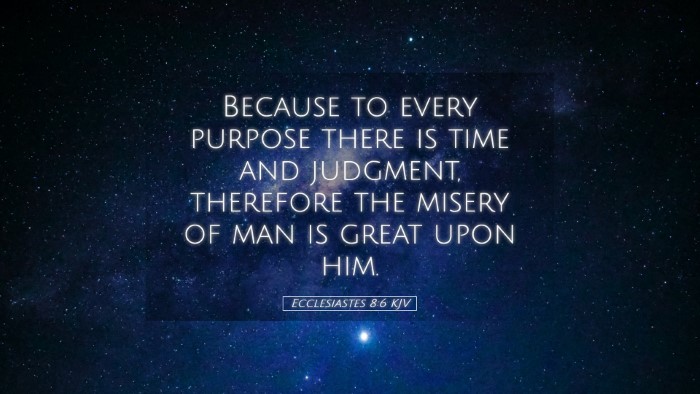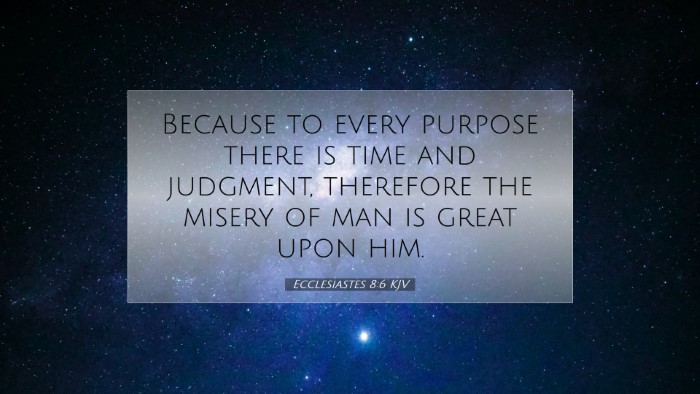Commentary on Ecclesiastes 8:6
Verse: "For there is a time and judgment for every matter, as to every work." (Ecclesiastes 8:6, ESV)
Introduction
The book of Ecclesiastes, attributed to Solomon, offers profound reflections on the nature of life, wisdom, and the realities of human existence. In Ecclesiastes 8:6, we encounter a significant theme regarding time and divine judgment, which resonates throughout the rest of the text. This commentary seeks to elaborate on the implications of this verse for pastors, students, theologians, and Bible scholars.
Textual Analysis
Ecclesiastes 8:6 emphasizes the interplay between time and the divine order. The phrases "time" and "judgment" suggest that there is a divinely appointed framework within which human actions take place. The structure of this verse invites us to consider the moral and ethical dimensions of our decisions.
Insights from Matthew Henry
Matthew Henry observes that every action under heaven is subject to a predetermined time set by the Creator. He notes the significance of understanding that while human life seems chaotic and unjust at times, there is an underlying divine judgment that governs all affairs.
- The Importance of Timing: Henry indicates that knowing the appropriate time for action is paramount. Misplaced actions often lead to regret and consequences.
- Divine Oversight: He emphasizes God’s oversight of human endeavors, reminding us that our works will ultimately be assessed by Him, which serves as a motivation for righteousness.
Insights from Albert Barnes
Albert Barnes expounds on the notion of "time" as it pertains to human affairs, stressing that every event has a specific occasion when it is most fitting to occur. He remarks on the balance of life's uncertainties with divine sovereignty.
- The Dichotomy of Time and Judgment: Barnes asserts that while men may not always perceive the right time for their acts, God’s judgment remains as a constant. This should instill a sense of urgency and awareness in the hearts of believers.
- Preparation for Judgment: Reflecting on the final judgment, Barnes reminds us that our daily lives should be lived in accordance with God’s will, preparing ourselves for the final accountability.
Insights from Adam Clarke
Adam Clarke provides a poignant reflection on the existential weight of time and judgment in human life. He delineates how understanding these concepts compels an individual to live with intention and moral clarity.
- Human Accountability: Clarke notes that the acknowledgment of time and judgment fosters a deeper sense of accountability among believers, impelling them to live virtuously.
- Grace in Judgment: He highlights that the message of the Gospel provides hope, as Christ's redemptive work allows for mercy amid divine judgment.
Theological Implications
This verse invites readers to appreciate the intersection of divine providence and human agency. It challenges believers to contemplate their lives within a framework of eternity, encouraging them to act with the realization that their choices carry weight in both the present and the future.
- Christian Living: Understanding that every work will be judged should compel Christians to engage in works that reflect their faith and the character of Christ.
- Hope in Divine Timing: The assurance that God has a timing for all things offers comfort amidst life's uncertainties. This fosters patience and steadfastness in the believer's walk.
Conclusion
Ecclesiastes 8:6 serves as a vital reminder of the divine wisdom inherent in the cosmic order. Through the insights gathered from various public domain commentaries, it becomes evident that the recognition of time and judgment is critical in a believer's life. This understanding not only fulfills theological discourse but also has practical applications in pastoral care, teaching, and personal reflection.
In light of this verse, may we be inspired to live in alignment with God’s timing and to conduct our works in anticipation of His ultimate judgment.


